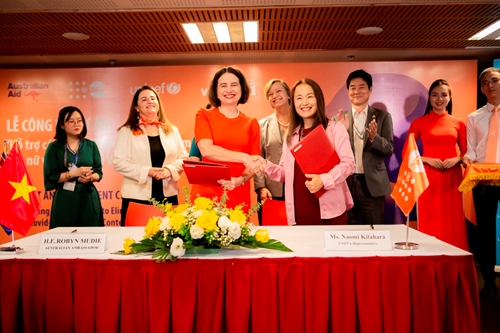The project will be co-implemented by the Ministry of Labor, Invalids and Social Affairs (MOLISA), the Ministry of Culture, Sports and Tourism (MOCST), the Ministry of Education and Training (MOET), the Vietnam Women’s Union, the Center for Studies and Applied Science in Gender, Family, Women and Adolescents (CSAGA) and other relevant stakeholders.
The project will support ongoing efforts by the Vietnamese Government and civil society organizations to strengthen the national prevention and response mechanisms to address violence against women and children in the context of COVID-19, and to ensure that all Vietnamese women and children, including those most vulnerable, can live a life free of violence.
    |
 |
|
At the project launching ceremony |
“Evidence shows that during crises and disasters, family and gender-based violence increases. During the COVID-19 pandemic, job losses and enforced home isolation have caused rates of violence against women and children to soar in countries around the world. Domestically, Australia has increased budgets to address family violence that has occurred as a result of the COVID-19. Today, Australia pledges its support to the Government of Vietnam to secure greater safety for women and children in its COVID-19 response,” said Australian Ambassador to Vietnam Robyn Mudie.
Australia is providing AUD 2.5 million to support the project, which will be implemented over the next year. This is part of Australia’s AUD10.5 million contribution to support Vietnam’s response to COVID-19.
The project will raise public awareness among women and girls, men and boys, parents/caregivers, children and adolescents of the increased risks of violence in the home, quarantine centers and other institutions. Increased support for survivors of violence will be delivered in four cities and provinces of Hanoi, Quang Ninh, Da Nang, and Ho Chi Minh City - the locations most affected by the COVID-19 over the past months. This will help ensure survivors have access to integrated and essential services. Innovative approaches will be introduced in communications and service provision work taking to account of special circumstances of COVID-19, in partnership with supermarkets, pharmacies and hotels.
“Ending violence against women and children should be a priority for everyone. There is no way for Vietnam to achieve the 2030 Sustainable Development Goals without addressing the issue of violence against women and children. It is about making sure that everyone is part of the country’s sustainable development process, leaving no one behind. We trust this new project will make a great leap forward to eliminate violence against women and girls in Vietnam,” said Ms. Naomi Kitahara, UNFPA Representative in Vietnam at the project launch, on behalf of the UNFPA, UNICEF and U.N. Women.
According to the National Study on Domestic Violence against Women in Vietnam, conducted by the General Statistics Office in 2010, 58 percent of ever-married women had experienced at least one of the three forms of violence (physical, sexual or psychological) in their lifetime. Approximately 50 percent of victims did not tell anyone about the violence they endured, and 87 percent did not seek any help from public services.
Meanwhile, the Multiple Indicator Cluster Survey (MICS5) in 2014 showed that, around two out of three children aged 1-14 years experienced some forms of violent discipline in the home. The Government of Vietnam reports over 2,000 cases of child abuse every year, of which 75 percent are of sexual abuse.
A pre-existing crisis of violence against women and children has been exacerbated in the context of the COVID-19. Recent reports have shown that restrictions in movement, social isolation and similar containment measures, coupled with existing or increased social and economic pressures and stress on families, have led to an increase in violence, particularly against women and children.
In Vietnam, the Peace House hotline 1900 969 680 (a shelter run by the Vietnam Women’s Union) and the Sunshine hotline 1800 1769 (as supported by UNFPA in Quang Ninh province in partnership with KOICA) have received twice as many calls for help over the past months compared to the same months in previous years. It has been reported that risks of physical abuse, sexual abuse and child sexual abuse and exploitation have increased substantially. Schools closure and social distancing measures exposed children to increased isolation and to substantial protection risks, threatening their safety and ultimately – their right to grow up and learn in a safe and protected environment away from harm. Most of the times, perpetrators of violence and abuse are well-known to the child.
Therefore, the new partnership among the Government of Vietnam, Government of Australia, UNFPA, UNICEF and U.N. Women are hoped to help end violence against women and children.
Song Anh